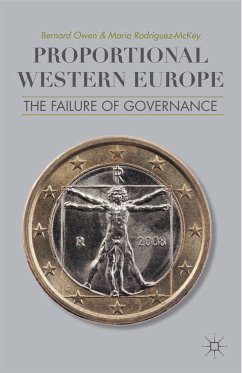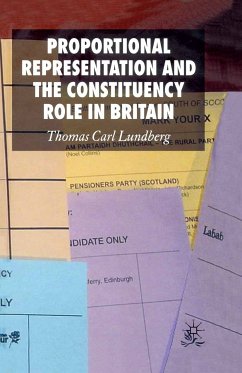Dieser Download kann aus rechtlichen Gründen nur mit Rechnungsadresse in A, B, BG, CY, CZ, D, DK, EW, E, FIN, F, GR, HR, H, IRL, I, LT, L, LR, M, NL, PL, P, R, S, SLO, SK ausgeliefert werden.
"Owen & Rodriguez-McKey's new book Proportional Western Europe provides scholars with pregnant new insights into the long-term sustainability and sometimes failure of governance in proportional electoral systems. Their encyclopedic overview of the impact of proportional electoral systems is based on seven small and three large Western European countries. It will become a must for those who want to better understand the successes and shortcomings of contemporary European politics." - Victor Pestoff, Professor, Institute for Civil Society Studies, Ersta Skondal University College, Sweden
"This is an important book and comes at the right time. Electoral systems are a toolkit in the pursuit of political power. Proportional systems can give voice to minorities where recognition contributes to peace and stability. Perhaps this is part of the solution in Ukraine today. Systems of this kind can also give disruptive minorities a balance of power and negative influence in excess of their overall voting strength. Forthcoming elections in Europe may prove the point! Owen and McKey have written a most thorough and detailed book. An excellent and very useful text at this time." - Dr. Thomas W K Scott, Retired, Councillor Democratization, Directorate General for External Relations, Commission of the European Union
'The bookdocuments historic failures of proportional voting systems to ensure that electorates have credible alternatives to outgoing governments at each election. With a ten-country case-study methodology, the authors identify factors which explain stabilities of electoral performance over time. They then focus on specific atypical elections, in which such stabilities are shaken. The most vivid of the studies portrays the 'mushroom' explosion of Denmark's anti-taxation party in 1973; the most spectacular, the collapse of the French Fourth Republic; the most tragic, the rise of the Nazi party in Weimar Germany. These findings - available in France for over a decade - contain the important message that proportional voting systems may have been "oversold" by the international community to countries transitioning to open market systems and democracy.' - John Hartland, ex-Presidential Advisor, Council of Europe Parliamentary Assembly, Post-elections Policy Consultant









